
Richard Milhous Nixon was the 37th president of the United States from 1969 to 1974. A lawyer and member of the Republican Party, he previously served as a representative and senator from California and was the 36th vice president from 1953 to 1961 under President Dwight D. Eisenhower. His five years in the White House saw reduction of U.S. involvement in the Vietnam War, détente with the Soviet Union and China, the Apollo 11 Moon landing, and the establishment of the Environmental Protection Agency and Occupational Safety and Health Administration. Nixon's second term ended early when he became the only U.S. president to resign from office, as a result of the Watergate scandal.

The Watergate scandal was a major political scandal in the United States involving the administration of President Richard Nixon from 1972 to 1974 that led to Nixon's resignation. The scandal stemmed from the Nixon administration's attempts to cover up its involvement in the June 17, 1972, break-in of the Democratic National Committee headquarters in Washington, D.C., at the Watergate Office Building.

The Saturday Night Massacre was a series of events that took place in the United States on the evening of Saturday, October 20, 1973, during the Watergate scandal. U.S. President Richard Nixon ordered Attorney General Elliot Richardson to fire Special Prosecutor Archibald Cox; Richardson refused and resigned effective immediately. Nixon then ordered Deputy Attorney General William Ruckelshaus to fire Cox; Ruckelshaus refused, and also resigned. Nixon then ordered the third-most-senior official at the Justice Department, Solicitor General Robert Bork, to fire Cox. Bork carried out the dismissal as Nixon asked. Bork stated that he intended to resign afterward, but was persuaded by Richardson and Ruckelshaus to stay on for the good of the Justice Department.

Ronald Louis Ziegler was the 13th White House Press Secretary and Assistant to the President, serving during United States President Richard Nixon's administration.

The White House Plumbers, sometimes simply called the Plumbers, the Room 16 Project, or more officially, the White House Special Investigations Unit, was a covert White House Special Investigations Unit, established within a week of the publication of the Pentagon Papers in June 1971, during the presidency of Richard Nixon. Its task was to stop and/or respond to the leaking of classified information, such as the Pentagon Papers, to the news media. The work of the unit "tapered off" after the bungled "Ellsberg break-in" but some of its former operatives branched into illegal activities while still employed at the White House together with managers of the Committee to Re-elect the President, including the Watergate break-in and the ensuing Watergate scandal. The group has been described as Nixon's "fixers".

The Watergate scandal refers to the burglary and illegal wiretapping of the headquarters of the Democratic National Committee, in the Watergate complex by members of President Richard Nixon's re-election campaign, and the subsequent cover-up of the break-in resulting in Nixon's resignation on August 9, 1974, as well as other abuses of power by the Nixon White House that were discovered during the course of the scandal.

The White House communications director or White House director of communications, also known officially as Assistant to the President for Communications, is part of the senior staff of the president of the United States. The officeholder is responsible for developing and promoting the agenda of the president and leading its media campaign.
Audio recordings of conversations between U.S. President Richard Nixon and Nixon administration officials, Nixon family members, and White House staff surfaced during the Watergate scandal in 1973 and 1974, leading to Nixon's resignation.
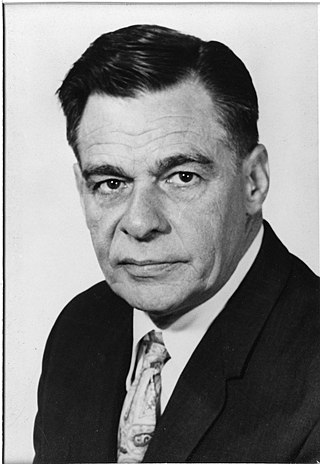
Henry E. Petersen was an attorney and United States federal government official. He served as Assistant U.S. Attorney General during the Richard Nixon and Gerald Ford administrations. He also engaged in ethically questionable communications with Nixon and his staff, providing inside information about the Watergate investigation prior to the appointment of the Special Prosecutor.
This bibliography of Richard Nixon includes publications by Richard Nixon, the 37th president of the United States, and books and scholarly articles about him and his policies.

Richard Nixon's tenure as the 37th president of the United States began with his first inauguration on January 20, 1969, and ended when he resigned on August 9, 1974, in the face of almost certain impeachment and removal from office, the only U.S. president ever to do so. He was succeeded by Gerald Ford, whom he had appointed vice president after Spiro Agnew became embroiled in a separate corruption scandal and was forced to resign. Nixon, a prominent member of the Republican Party from California who previously served as vice president under Dwight D. Eisenhower, took office following the 1968 presidential election, in which he defeated Hubert Humphrey, the then-incumbent vice president. Although he had built his reputation as a very active Republican campaigner, Nixon downplayed partisanship in his 1972 landslide reelection.
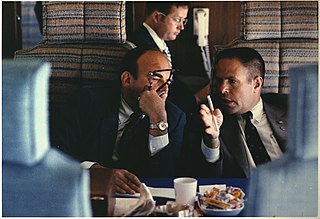
Operation Sandwedge was a proposed clandestine intelligence-gathering operation against the political enemies of U.S. President Richard Nixon's administration. The proposals were put together by Nixon's Chief of Staff H. R. Haldeman, domestic affairs assistant John Ehrlichman and staffer Jack Caulfield in 1971. Caulfield, a former police officer, created a plan to target the Democratic Party and the anti-Vietnam War movement, inspired by what he believed to be the Democratic Party's employment of a private investigation firm.
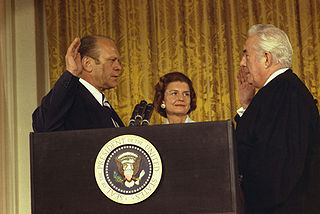
The inauguration of Gerald Ford as the 38th president of the United States was held on Friday, August 9, 1974, in the East Room of the White House in Washington, D.C., after President Richard Nixon resigned due to the Watergate scandal. The inauguration – the last non-scheduled, extraordinary inauguration to take place in the 20th century – marked the commencement of Gerald Ford's only term as president. Chief Justice Warren E. Burger administered the oath of office. The Bible upon which Ford recited the oath was held by his wife, Betty Ford, open to Proverbs 3:5–6. Ford was the ninth vice president to succeed to the presidency intra-term, and he remains the most recent to do so, as of 2023.
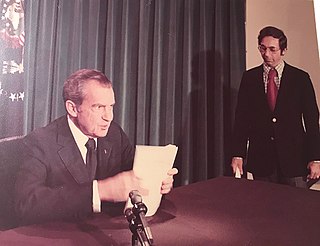
President Richard Nixon made an address to the American public from the Oval Office on August 8, 1974, to announce his resignation from the presidency due to the Watergate scandal.
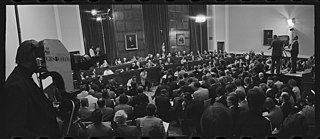
The impeachment process against Richard Nixon was initiated by the United States House of Representatives October 30, 1973, during the course of the Watergate scandal, when multiple resolutions calling for the impeachment of President Richard Nixon were introduced immediately following the series of high-level resignations and firings widely called the "Saturday Night Massacre". The House Committee on the Judiciary soon began an official investigation of the president's role in Watergate, and, in May 1974, commenced formal hearings on whether sufficient grounds existed to impeach Nixon of high crimes and misdemeanors under Article II, Section 4, of the United States Constitution. This investigation was undertaken one year after the United States Senate established the Select Committee on Presidential Campaign Activities to investigate the break-in at the Democratic National Committee headquarters at the Watergate office complex during the 1972 presidential election, and the Republican Nixon administration's attempted cover-up of its involvement; during those hearings the scope of the scandal became apparent and the existence of the Nixon White House tapes was revealed.

Proclamation 4311 was a presidential proclamation issued by President of the United States Gerald Ford on September 8, 1974, granting a full and unconditional pardon to Richard Nixon, his predecessor, for any crimes that he might have committed against the United States as president. In particular, the pardon covered Nixon's actions during the Watergate scandal. In a televised broadcast to the nation, Ford, who had succeeded to the presidency upon Nixon's resignation, explained that he felt the pardon was in the best interests of the country and that the Nixon family's situation was "a tragedy in which we all have played a part. It could go on and on and on, or someone must write the end to it. I have concluded that only I can do that, and if I can, I must."
The presidency of Richard Nixon began on January 20, 1969, when Richard Nixon was inaugurated as the 37th president of the United States, and ended on August 9, 1974, when, in the face of almost certain impeachment and removal from office, he resigned the presidency.
The following is a timeline of the presidency of Richard Nixon from his inauguration as the 37th president of the United States on January 20, 1969, to December 31, 1969.
The following is a timeline of the presidency of Lyndon B. Johnson from January 1, 1968, to January 20, 1969.

The following is a timeline of the presidency of Richard Nixon from January 1, 1970, to December 31, 1970.













